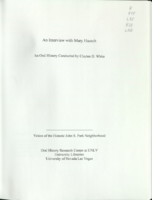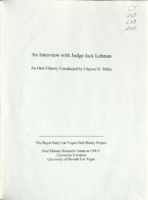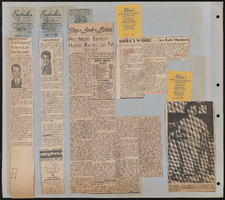Search the Special Collections and Archives Portal
Search Results

Eric Mendoza oral history interview: transcript
Date
Archival Collection
Description
Oral history interview with Eric Mendoza conducted by Holly O'Donnell on November 29, 2021 for Reflections: The Las Vegas Asian American and Pacific Islander Oral History Project. In this interview, Eric Mendoza shares his family's chain migration history from Manila, Philippines to the United States and his difficult immigration and naturalization process once arriving in America in 1996. He talks about what brought him to live in Las Vegas, Nevada, his education and professional pursuits, what his life is like in the United States compared to that of the Philippines, and the lives of his eight siblings. Eric Mendoza discusses the historical past of the Philippines, the infrastructure in place there, and government corruption. He also speaks to Filipino traditions and festivals, food and customs, his cultural identity, and assimilating to American culture.
Text
North Las Vegas Bicentennial Committee Photographs and Drawings of Kiel Ranch
Identifier
Abstract
The North Las Vegas Bicentennial Committee Photographs and Drawings of Kiel Ranch document the buildings on Kiel (Kyle) Ranch in 1974. As part of the commemoration of the United States bicentennial, the North Las Vegas City Council elected to restore Kiel Ranch, which was one of the first non-indigenous settlements in the Las Vegas Valley. The materials include black-and-white photographs of Kiel Ranch as it was in 1974 as well as architectural drawings of planned renovations to the main house, the Brown House, the foreman's house, and the ranch hands' house.
Archival Collection

Gene Leavitt interview, February 28, 1979: transcript
Date
Archival Collection
Description
On February 28, 1979, collector Monte Leavitt interviewed Gene Leavitt (born October 6th, 1923 in Mesquite, Nevada) at his home in North Las Vegas, Nevada. In this interview, Mr. Leavitt talks about his career as a truck and bus driver. He also talks about the life in Southern Nevada, the soldiers stationed here, and gambling.
Text
Dennis McBride LGBTQ Poster and Sign Collection
Identifier
Abstract
The Dennis McBride LGBTQ Poster and Sign Collection (1977-2018) contains posters and signs created by the Las Vegas, Nevada Lesbian, Gay, Bisexual, Transgender, and Queer/Questioning (LGBTQ) community, collected by historian Dennis McBride. These handmade and commercially printed signs cover events of particular interest to the Las Vegas, Nevada LGBTQ community, including social events, entertainment venues, political rallies, and Gay Pride events.
Archival Collection

Transcript of interview with Mary Hausch by Claytee D. White, April 7, 2009
Date
Archival Collection
Description
Text

Transcript of interview with Jerome "Jerry" Jay Vallen by Lisa Gioia-Acres, October 2, 2007
Date
Archival Collection
Description
Text
Kiel Ranch Preservation Committee Records
Identifier
Abstract
The Kiel Ranch Preservation Committee Records (1973-2005) document the activities of the North Las Vegas Bicentennial Committee (1973-1976) and its successor, the Advisory Board for Kiel Ranch (1978-1995), in their efforts to restore Kiel Ranch, one of the earliest non-indigenous settlement sites in the Las Vegas, Nevada area. The collection contains various official reports on Kiel Ranch, proposals on how to restore Kiel Ranch, chronological files for each year of the project, and newspaper clippings on the status of Kiel Ranch.
Archival Collection

Transcript of interview with Jack Lehman by by Claytee White, October 17, 2007
Date
Archival Collection
Description
Judge Jack Lehman is living the life we should all strive for - a wonderful family, a work ethic that has allowed him to serve others while enjoying a magnificent life and above all a great love affair with his beautiful artistic wife, Lou Lou. From Chemnitz, Germany, at the beginning of the Nazi reign to a prominent citizen of Las Vegas, Lehman lives an extraordinary Las Vegas life. Born in Germany in the late 1920s, Jack and his sister were sent to the United States in 1935 and after a series of living situations including a orphanage in New York, they were adopted by the Lehman family in Lake Arrowhead, California. As a young boy, he wanted to become a lawyer. After a degree from Berkeley, two tours of military duty, a stint in radio broadcasting, and serving as the Director of the Nevada Department of Economic Development, he entered law school at USC. Lehman's career in the legal field began at the largest law firm in the city - Lionel Sawyer and Collins - and then into private practice and on to the bench as a District Court judge appointed by Governor Richard Bryan. In February 2008, he was honored by judges and friends statewide as the founder of Nevada's Adult Criminal Drug Court Program commonly known as "drug court." Washoe County District Judge Peter Breen said it best, "The state is a much better place because of Jack. All those people came back from the abyss of addiction because of Jack."
Text


